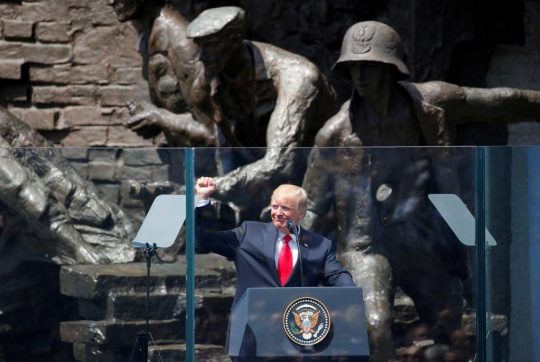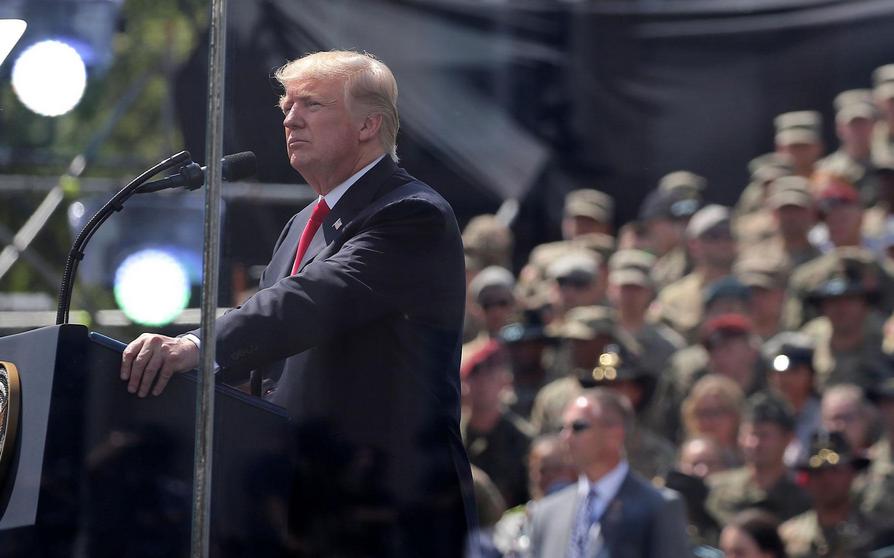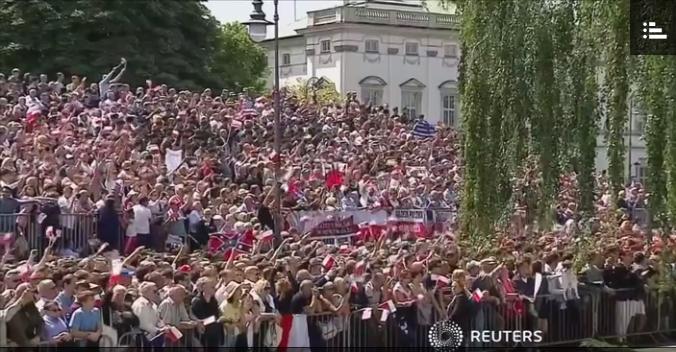U.S. President Trump’s Warsaw Speech in defence of Civilization

U.S. President Donald Trump addresses the people of Poland in front of the Warsaw Uprising Monument at Krasiński Square in Warsaw, Poland on July 6, 2017.
Trumps asks if the West has the will to survive.
If you doubted Donald Trump has what it takes to make America great again, and to lead the civilised world against a frightening array of enemies, then you will be heartened by his brilliant Warsaw speech.
Trump’s ‘remarkable’ speech in Poland
Jul 6, 2017 by Michael Barone, The Washington Examiner
http://www.washingtonexaminer.com/trumps-remarkable-speech-in-poland/article/2627946
Some observations on what Matthew Continetti rightly calls Donald Trump’s “remarkable” speech in Warsaw, Poland.
(1) This was a speech filled with remarkably apt references to Polish history, a subject surely few people suspected the president came to office familiar with. There were multiple references to Pulaski and Kosciusko, the Poles who crossed the Atlantic to fight for American independence, and to the Miracle of Vistula in 1920, when the Polish army under General Pilsudski repelled a Soviet invasion.
Trump recounted Pope John Paul II’s 1979 sermon before 1 million of his fellow Poles and how they responded by chanting, “We want God.” “Poland is the story of a people who have never lost hope, who have never been broken, and who have never, ever forgotten who they are.”

It’s interesting that a president who proclaims he serves “America first” should make a point of hailing Polish nationalism. It provides credibility to Trump appointees who say that “America first” does not mean “America alone.” It shows that an American nationalist can appreciate and admire another nation’s nationalism. (Ed: It’s called nationalist solidarity).
(2) There were plenty of barbs directed at the former Soviet Union, whose downfall Vladimir Putin once called the great tragedy of the 20th century. Trump noted that in 1939 Poland was invaded “by Nazi Germany from the west and the Soviet Union from the east”; he made reference to the Katyn forest massacre of Polish leaders by the Soviets, the responsibility for which was denied for decades by Russians; he vividly and at considerable length described how the Red Army paused before Warsaw and let the Wehrmacht perpetrate a “hell on earth” massacre of Poles. During the Cold War, he said, “You stood in solidarity against oppression, against a lawless secret police, against a cruel and wicked system that impoverished your cities and your souls. And you won. Poland prevailed. Poland will always prevail.”
These are not words that former KGB agent Vladimir Putin — whom some liberals still seem to regard as Trump’s puppeteer — likes to hear, or memories he likes to hear evoked.
(3) More than these historic references, Putin must dislike Trump’s call for Russia to “cease its destabilizing activities in Ukraine and elsewhere and its support for hostile regimes —including Syria and Iran.”
And Putin must dislike also Trump’s promise to secure “your access to alternative sources of energy, so Poland and its neighbors are never again held hostage to a single supplier of energy.” The alternative source, of course, is liquefied natural gas plentifully provided by America’s fracking revolution and being offloaded from ships in Poland’s port on the Baltic Sea. The “single supplier” is Putin’s Russia, which has exerted pressure on European countries by threatening to shut off (and in at least one case actually shutting off) the flow of gas in pipelines from Russia.
(4) Trump has been rightly criticized for not affirming, during his previous European trip, American support for NATO’s Article V requiring members to come to the defense of other members in the event of attack. In Warsaw he stated forthrightly and ungrudgingly, “We stand firmly behind Article V, the mutual defense commitment.” He hailed Poland for sending its highly competent troops to Afghanistan and Iraq, for spending the required 2 percent of GDP on defense and for its plans to increase that commitment, he patted himself on the back for successfully pressing other NATO members to meet that goal.
(5) “Our defense is not just a commitment of money; it is a commitment of will,” he said. “The fundamental question of our time is whether the West has the will to survive.” That most of Europe does not is the thesis of British author Douglas Murray’s excellent and disturbing new book, The Strange Death of Europe: Islam, Identity, Immigration; Trump argues (and I think Murray would agree) that Poland has been an exception to this dangerous trend. It has barred Muslim immigration and refugee influxes (and, not coincidentally, has not suffered the attacks of Islamic terrorists so common in Britain, France, Belgium and Germany). Trump implicitly endorsed this policy, saying that America “will always welcome new citizens who share our values and love our people, [but] our borders will always to closed to terrorism and extremism of any kind.”
This is a rebuke, without mentioning any names, of German Chancellor Angela Merkel’s unilateral decision to welcome 1 million unvetted “refugees” to her country and to other European Union members who have accepted the Schengen Treaty, ending border controls. Trump’s praise of Poland for its long-standing “commitment of will” is an implicit rebuke of those European countries, which arguably lack such commitment, a rebuke that brings to mind Donald Rumsfeld’s 2003 contrast of “Old Europe” and “New Europe,” when France and Germany refused to support American efforts in Iraq and nations like Poland and the Baltic states did. “Our citizens did not win freedom together, did not survive horrors together, did not face evil together, only to lose our freedom to a lack of pride and confidence in our values.” And unlike his two predecessors, he said out loud that “We are fighting hard against radical Islamic terrorism, and we will prevail.”
(6) Trump announced that the United States will sell the most advanced Patriot missile defense systems to Poland. This is a reversal of the policy of the Obama administration, which in 2009 abruptly abandoned the American commitment to station missile defense batteries in Poland and the Czech Republic — a decision that so irritated the Polish government of the time that its president reportedly refused to accept a midnight telephone call from then-Secretary of State Hillary Clinton announcing the decision.
(7) There were echoes of two historic presidential speeches delivered in Berlin: Ronald Reagan’s call in 1987 for Mikhail Gorbachev to tear down the Berlin wall and John F. Kennedy’s challenge in 1962 to those who saw no moral difference between the West and the Soviet Union. “If we do not have strong families and strong values, then we will be weak and we will not survive. If anyone forgets the critical importance of these things, let them come to a country that never has. Let them come to Poland. And let them come here, to Warsaw, and learn the story of the Warsaw Uprising.”

Ignore the Trump haters. His defence of Western civilisation is right
July 9,2017, by Miranda Devine
http://www.dailytelegraph.com.au/rendezview/ignore-the-trump-haters-his-defence-of-western-civilisation-is-right/news-story/833f2eebe05f490456f4473237b08920
Trumps asks if the West has the will to survive.
If you doubted Donald Trump has what it takes to make America great again, and to lead the civilised world against a frightening array of enemies, then you will be heartened by his brilliant Warsaw speech.
He briefly named Islamic terrorism as the latest totalitarian ideology which threatens our freedoms. He was tough on Russia, while emphasising shared values, laying the parameters for a useful meeting with Vladimir Putin the next day.
But, most remarkably, he singled out for praise the unique moral virtues of Western civilisation, and referenced God ten times.
He spoke of nations being more than the sum of their GDP, with faith in God, family and “the dignity of every human life” crucial to our survival.
“We can have the largest economies and the most lethal weapons anywhere on Earth, but if we do not have strong families and strong values, then we will be weak and we will not survive…
“Our own fight for the West does not begin on the battlefield. It begins with our minds, our wills and our souls.”
Of course this all sent Trump-haters into Exorcist-style head spins, damning the speech as “muddled thinking and dark nativism”. The Atlantic said it was “racist” and paranoid. The Washington Post labelled it “dark and provocative”. Vox slammed it as an “alt-right manifesto”.
Judge for yourself.
“The fundamental question of our time is whether the West has the will to survive,” said Trump.
“Do we have the confidence in our values to defend them at any cost? Do we have enough respect for our citizens to protect our borders? Do we have the desire and the courage to preserve our civilisation in the face of those who would subvert and destroy it?”
It was powerfully symbolic for Trump to choose Poland to make such a speech before joining the sneering elitists of Europe at the G20, hosted by German chancellor Angela Merkel.
It comes at a time when Poland is resisting pressure from the EU to take in a “quota” from among more than a million asylum seekers, mainly young Muslim men, who have entered Europe from the Middle East and Africa since Merkel opened the borders in 2015.
Trump spoke in Krasinski Square, in a city entirely rebuilt after WWII, in front of a monument to 200,000 Poles killed in the heroic Warsaw uprising against the Nazis in 1944, as described in Norman Davies’ Rising ‘44.
A secret pact between Hitler and Stalin saw Poland invaded by Nazi Germany from the west and the Soviet Union from the east, and then the Allies betrayed Poland to appease Stalin. The defeat of Hitler only plunged the Poles into nearly 50 years of Communist oppression.
But with the help of their own saint, Pope John Paul II, Trump said “the Poles reasserted their identity as a nation devoted to God”.
“The story of Poland is the story of a people who have never lost hope, who have never been broken and who have never, ever forgotten who they are.
“And when the day came on June 2nd, 1979, and 1 million Poles gathered around Victory Square for their very first mass with their Polish pope, that day every Communist in Warsaw must have known that their oppressive system would soon come crashing down.
“They must have known it at the exact moment during Pope John Paul II’s sermon when a million Polish men, women and children suddenly raised their voices in a single prayer.
“A million Polish people did not ask for wealth. They did not ask for privilege. Instead, one million Poles saying three simple words: “We want God….
“And with that powerful declaration of who you are, you came to understand what to do and how to live.”
That message is as true today as ever: “The people of Poland, the people of America and the people of Europe still cry out, ‘We want God’.”
Trump understands that the greatest threat we face is from our own postmodern elites who want to erase the history, tradition and faith of Western civilisation, which they find shameful and inconvenient.
His speech was a call to arms against the enemy within.
“If left unchecked, these forces will undermine our courage, sap our spirit and weaken our will to defend ourselves and our societies.”
Ultimately, Trump was optimistic, lauding Poland as an example for those “who wish to summon the courage and the will to defend our civilisation…
“Just as Poland could not be broken, I declare today for the world to hear that the west will never, ever be broken. Our values will prevail. Our people will thrive. And our civilisation will triumph.”
As imperfect and vulgar as Trump can be, his genius lies in his ability to create the “safe space” in which others can pursue freedom.
The condemnation shows how important this speech was. It marks either our civilisation’s last gasp or the beginning of the renaissance. Which way it goes depends on us.

Poles celebrate President Trump’s speech
Trump’s speech was more productive than the entire G20 Summit over the subsequent weekend in Hamburg.
